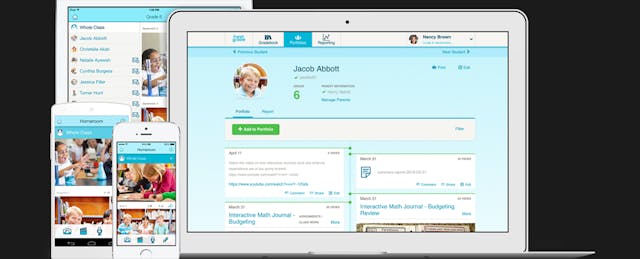Selling your company to Disney for $350 million would mark the pinnacle for most people’s career. Not so for Lane Merrifield, who started and sold Club Penguin for that amount. He was bit by the edtech bug when he realized how little he knew about his kids’ days at school. “There’s no reason we should live in a world where we know more about what my aunt did on her vacation last week, than what my kid did in her class today,” he tells EdSurge in an interview.
Since 2012, Merrifield has been leading FreshGrade, a startup behind a web and mobile tool that allows teachers to assign, assess and share students’ work via digital portfolios. Today, the company is showcasing one major completed assignment: securing $11.6 million in its Series A round.
This funding brings back several investors who supported FreshGrade’s $4.3 million seed round in 2014, including Reach Capital, Accel Partners and Emerson Collective. New investor Relay Ventures led this Series A round. Altogether, the Canadian startup based in Kelowna has raised $15.9 million.
More than a million students, parents and students across 70 countries currently use FreshGrade’s portfolio tool. The company has captured double-digit market shares in several Canadian provinces, although the majority of its users are in the U.S.
Using FreshGrade, teachers can create activities and assignments, then collect, capture and grade students’ work (which can be text, video or audio), and share feedback with parents. These offerings are available to educators for free. Additional features—including automatic syncing with student information systems, data integration with administrative reporting tools, and single sign-on functionality—are available as a premium service. Merrifield was mum about how many are paying, only sharing that “we have 100 percent retention among paying districts.”

Charging parents isn’t part of the plan for the time being. “The challenge with trying to monetize parents is that you have those who can afford it, and those who can’t,” remarks Merrifield. “That’s a road that’s unfair to go down.”
There is a logjam of companies currently attempting to solve the teacher-student-parent communication problem. There’s Brightwheel, which recently wooed some investment dollars from Mark Cuban. Remind claims 35 million users of its school communication tool. FreshGrade even shares an investor—Reach Capital—with ClassDojo, whose app is designed to help teachers share classroom moments with parents.
Merrifield often fields questions comparing FreshGrade and ClassDojo. “Beyond sharing a video or photo, we focus on capturing the learning that’s taking place,” he explains. Teachers create explicit assignments with learning objectives and can choose from different assessment options (including letter grade, percentages or a custom mastery-based scale.) Parents can see teachers’ comments in their kids’ individual portfolios. This blend of qualitative and quantitative data, Merrifield believes, is what fuels FreshGrade’s growth.
Some schools, such as Bullis Charter School in Los Altos, Calif., have implemented FreshGrade’s digital portfolios to complement report cards for all of its approximately 800 K-8 students. The company insists it is not trying to replace report cards, but instead offer “a live feed that allows interventions by parents and teachers to happen much quicker,” says Steve Wandler, another co-founder at FreshGrade.
FreshGrade currently has 34 full-time employees and is building sales teams across North America. The founders acknowledge they haven’t yet examined their tool’s impact on learning outcomes, although they are in the process of working with a handful of universities to conduct year-long studies. For now, supportive anecdotal evidence comes in the form of letters that the company receives every week.
Merrifield says he’s learned plenty, however, to debunk assumptions that teachers are luddites who don’t know how to use technology. “Having seen some of the crappy tools that teachers have had to use over the past years, I’d say they’re more tech savvy than us,” he states. “Most of us wouldn’t put up with what they have had to use.”


